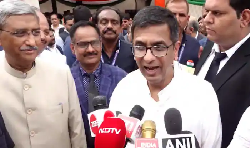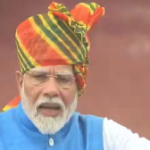Chief Justice of India DY Chandrachud highlighted the significance of freedom while addressing the Independence Day ceremony held at the Supreme Court premises. Reflecting on the recent turmoil in Bangladesh, the CJI said, “What has happened in Bangladesh reminds us of the value of freedom.”
Chandrachud said that the country’s choice of adopting the Constitution in 1950 also meant embracing the uncertainty of freedom over slavery. He shared his personal experience, “Many of us lawyers were born after Independence, including myself. However, we have also witnessed the Emergency era… Today, we can take freedom lightly, but the past struggles remind us of its priceless value.”
we celebrate the dedication of those who have lived and are working to enhance our nation. We reflect on our Constitution against the backdrop of the colonial era and our country’s tribulations. This morning, I read an eloquent piece by renowned Karnataka vocalist Chitra Sri Krishna titled ‘Songs of Freedom’, he added.
“The essence of liberty is interlaced with Indian poetry,” he said. “In 1950, we embraced the uncertainty of freedom, and current events in places like Bangladesh remind us of liberty’s value. Taking freedom for granted is easy, but remembering historical narratives is crucial to appreciate its significance,” added the CJI. He also paid homage to the freedom fighters who abandoned their legal careers to join the national movement.
“Numerous lawyers quit their practices to serve the nation’s cause. Figures like Babasaheb Ambedkar, Jawaharlal Nehru, Alladi Krishnaswamy Iyer, Govind Vallabh Pant, Devi Prasad Khaitan, and Sir Syed Mohammed Saadullah were pivotal in India’s liberation and the establishment of an independent judiciary,” he stated.
“Having served as a judge for 24 years, I can assert that the judiciary’s work mirrors the daily struggles of ordinary Indians. The Supreme Court of India witnesses a multitude of litigants from diverse villages and cities, across all castes, genders, and religions, seeking justice. The legal fraternity empowers the court to deliver justice to these individuals,” he continued.
He emphasized that a modern judiciary, at the intersection of citizens and the legal profession, necessitates accessible and inclusive infrastructure. “Facilitating lawyers’ court navigation not only aids their efficiency but also enhances their sense of belonging,” he concluded.



